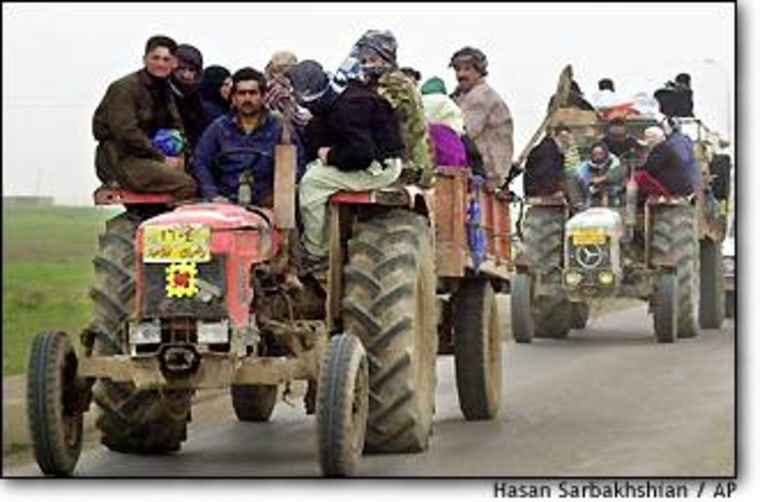As U.S. and British forces began their assault on Saddam Hussein’s regime on Thursday, the minority Kurdish population of northern Iraq braced for backlash from a war they have longed for and feared.
The rain-swept streets of Sulaimaniyah were deserted when the attacks started at dawn local time on Thursday.
The early morning calm was in contrast to the rushed atmosphere 30 miles south on the front line between Saddam’s military and Kurdish opposition forces. In recent days, thousands of Kurds have fled Baghdad-controlled areas for the relative safety of northern Iraq.
Long targeted by Saddam, the Kurds have been preparing for months for the U.S.-led war.
Ahead of the U.S.-led attack, Kawa Ali, a 43-year-old electrician, taped plastic over the windows of his two-story home in Sulaimaniyah — an attempt to protect his wife, two children and mother from the chemical or biological attacks Kurds fear Saddam could launch in retaliation to Washington’s war against Baghdad.
“Saddam said those who are helping the Americans will be eliminated from the map,” Ali said. Iraq’s Kurds are strong supporters of the Bush administration’s plans to topple the Iraqi leader.
In the Ali family’s living room, plastic containers filled with beans, salt, sugar, rice and bread would feed 14 people for three weeks, Ali said — enough for his relatives, too.
In northern Iraq, however, few people have the luxury of planning their meals weeks in advance. Saddam’s decades-long persecution of Iraq’s Kurdish minority has displaced hundreds of thousands from their homes. In northern Iraq, now a safe haven in the U.S. and UK no-fly zone, officials estimate over 800,000 Kurds lack adequate shelter.
BRACING FOR REFUGEES
In the 1991 Gulf War, many Kurds and other Iraqis fled to neighboring Iran, Turkey and Syria, fearing the conflict and backlash from Saddam. While relief workers and government officials brace for another exodus, they say the 12 years since the Gulf War have changed their humanitarian mission. The three northern provinces of Iraq protected by the no-fly zone have developed into a bustling democracy, offering services and support that weren’t available to refugees in 1991.
“In 1991, it wasn’t a pleasant experience for most refugees,” said Nasreen Sideek, the Kurdish regional government’s minister for reconstruction and development, herself a refugee during the Gulf War. “This time, people won’t think of going [to other countries]. People will find enough space and services to feel safe within Iraq’s borders.”
Locals in Sulaimaniyah appear to agree. They are buoyed by a feeling that Saddam’s ouster is close, after years of failed Kurdish uprisings.
“We will not leave our land like we did in 1991,” said Kurdish electrician Ali, stockpiling for a war. “It will be better for us to die than to leave our country.”
Still, some relief officials express concern at the lack of preparation for a refugee exodus. Iran, Syria and Turkey have brought some humanitarian resources to their borders with Iraq. In Iraq’s north, however, there has been little groundwork laid for a humanitarian crisis.
A reverse flow of Kurds could also pose serious problems. Some 120,000 Kurdish residents of oil-rich Kirkuk have been forced from their land over the last three decades. They are expected to return to their homes which Saddam turned over to Arab families also displaced by the Iraqi ruler’s policies. Some relief workers have warned that after U.S. forces secure civilian areas, a mass return of Saddam’s victims to their homes could spark ethnic bloodletting.
(MSNBC.com’s Preston Mendenhall is on assignment in northern Iraq.)
